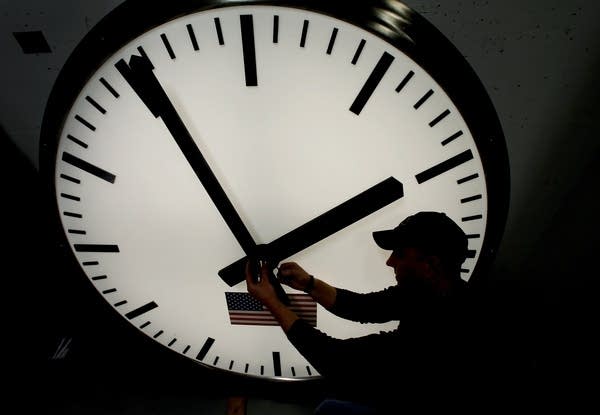Daylight saving time: Good or bad for you?

Go Deeper.
Create an account or log in to save stories.
Like this?
Thanks for liking this story! We have added it to a list of your favorite stories.
This story was originally published in 2015. Portions of it have been updated.
It's that time of year again when clocks spring forward and everyone grumbles about losing an hour of sleep. That's right — daylight saving time starts on Sunday.
There is a purpose to it. Since we end up gaining more daylight in the evenings, it's meant to save energy by reducing electricity usage.
Turn Up Your Support
MPR News helps you turn down the noise and build shared understanding. Turn up your support for this public resource and keep trusted journalism accessible to all.
In the United States, daylight time runs from 2 a.m. on the second Sunday of March until 2 a.m. on the first Sunday of November in areas that don't exempt themselves.
Most of the United States observes the time change, but not every place makes the switch. The exceptions are Hawaii, most of Arizona, Puerto Rico, the Virgin Islands, American Samoa, Guam and the Northern Marianas.
But is it truly beneficial? A 2014 Rasmussen Reports survey found that just 33 percent of American adults think daylight saving time is worth the hassle.
There are also conflicting reports over whether switching over to daylight time is hazardous to your health and the economy.
Here's a roundup of some of that coverage. Which side are you on?
P.S. Now is a good time to change the batteries on your smoke detectors, too.
It's good for you!
It can take away the winter blues
In an interview with The Huffington Post Canada, Dr. Anthony Levitt, a scientist at the Sunnybrook Research Institute, said that as the days get longer, the effects of seasonal affective disorder fade away.
More daylight = less time on your couch + more time outdoors
Environmental economist Hendrick Wolf and his colleagues were among several groups that found a boost in recreational activities. He elaborated in this National Geographic article:
"We found that during the period of the 2007 (daylight) extension, people engaged in more outdoor recreation and less indoor-TV watching. An additional 3 percent of people engaged in outdoor behaviors who otherwise would have stayed indoors."
It's good for the economy, so everybody wins
The theory is that because people are out later, they spend more money. Here's what Michael Downing, a Tufts University lecturer and author of "Spring Forward: The Annual Madness of Daylight Saving Time," told The Takeaway:
"Since 1915, the principal supporter of daylight saving in the United States has been the Chamber of Commerce on behalf of small business and retailers. The Chamber understood that if you give workers more sunlight at the end of the day they'll stop and shop on their way home."
It's bad for you!
It could wreak havoc on your health
You're losing sleep not just for one night. Dr. Charles Czeisler, a sleep medicine professor, told MPR News:
"It makes a huge difference, first of all, because of the sleep we lose that night. We cut the hour out of the nighttime, so suddenly at 2 o'clock in the morning it becomes 3 o'clock in the morning.
And secondly, we have to reset our internal biological clock that controls the timing of sleep.
It makes it more difficult for us to get the sleep we need, even in the following week.
It's interesting: There's a 17 percent increased risk of motor vehicle crashes in the week after this change, and there's also a 5 percent increased risk in myocardial infarctions, or heart attacks."
More traffic accidents
Did he say more accidents? Several studies have found that traffic accidents tend to spike after we make the switch to daylight saving time because of groggy drivers.
We're less productive at work and its costing America
A recent study published in the Journal of Applied Psychology found workers "cyberloaf" — surf the Web, check Facebook, watch cat videos — at a higher rate on the Monday after springing forward. By one estimate, this lack of productivity, in addition to health woes and workplace injuries as a result of sleepiness, is costing the American economy $434 million annually.
The Associated Press contributed to this report.


